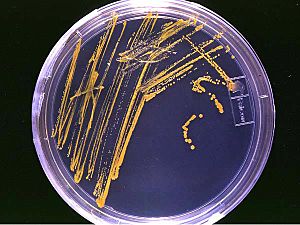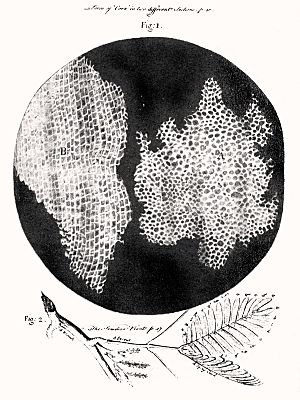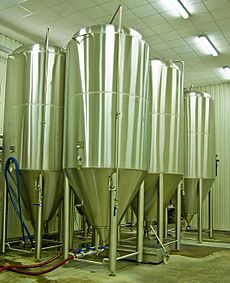Microbiology facts for kids
Microbiology is a science that studies tiny living things called microorganisms. These are so small you need a microscope to see them! The word "microbiology" comes from Greek words meaning "tiny," "life," and "science."
Microbiology is part of biology. It looks at many different types of tiny life forms. These include bacteria, archaea, microscopic fungi, protozoa, algae, and viruses. Scientists who study microbiology learn about how these tiny creatures are grouped, what they look like, how they work, and how they have changed over time. They also study their role in nature and how we can use them in helpful ways. Bacteriology is a special part of microbiology that focuses only on bacteria.
Contents
How We Discovered the Tiny World
The story of microbiology began a long time ago. In 1665, a scientist named Robert Hooke looked at a piece of cork through his microscope. He saw that it was made of tiny boxes, which he called cells.
Later, Antonie van Leeuwenhoek made a very important discovery. He used his own simple microscopes to look at water and other things. He was amazed to see tiny, moving "animalcules," which were actually single-celled organisms. This showed that cells were living things!
As microscopes got better, scientists learned more. Christian Gottfried Ehrenberg found that tiny living things like protists and bacteria were different kinds of cells. In the late 1800s, Martinus Beijerinck discovered even smaller particles called viruses.
A big change in studying microorganisms came with the discovery of DNA and RNA. These are like the instruction manuals inside cells. Now, scientists can change parts of a cell without harming it. This is done using special tools called vectors. More recently, scientists also found "jumping genes," called transposons. These are pieces of DNA that can move around within a cell's genetic material.
Amazing Uses of Microbes
Some people might worry about microbes because some can cause sickness. But many microbes are actually very helpful! They do many important jobs for us and for the planet.
Microbes in Food and Medicine
Microbes are super important in making many foods we enjoy. For example, yeast (a type of fungus) helps make bread rise and is used to brew beer. Bacteria help turn milk into dairy products like yogurt and cheese. They also help make vinegar. This process is called industrial fermentation.
Microbes also help us make antibiotics. These are medicines that fight off bad bacteria. For instance, some types of Streptomyces bacteria are used to create important antibiotics.
Microbes and New Materials
Tiny microorganisms can also create special materials called biopolymers. These are like natural plastics or gels. Scientists can use them to make things for medicine, such as materials for tissue engineering or for delivering medicines inside the body. Examples include xanthan and alginate, which are used in many products.
Microbes Cleaning Up the Earth
Microbes are like tiny cleanup crews! They can help break down toxic waste and pollution in soil, water, and even the ocean. This process is called microbial biodegradation or bioremediation. Different microbes can break down different types of pollution. So, scientists often use a mix of bacteria and fungi to clean up polluted areas effectively.
Microbes and Your Health
Did you know that many microbes live inside your body? They form what's called your microbiome. These friendly microbes are very important for your health. They help you digest food, make important vitamins, and even protect you from harmful germs.
You can help these good microbes by eating fermented foods like yogurt. You can also take probiotics, which are good bacteria, or prebiotics, which are foods that help good bacteria grow. Scientists are still learning a lot about how our microbiome affects our health and how we can keep it healthy.
Images for kids
-
Avicenna thought that tiny, unseen things could cause sickness.
-
Antonie van Leeuwenhoek (1632–1723)
-
Van Leeuwenhoek's microscopes by Henry Baker
-
Martinus Beijerinck is often called a founder of the study of viruses.
-
New lab tools helped scientists like Louis Pasteur study bacteria in the late 1800s.
See also
 In Spanish: Microbiología para niños
In Spanish: Microbiología para niños
 | Stephanie Wilson |
 | Charles Bolden |
 | Ronald McNair |
 | Frederick D. Gregory |










